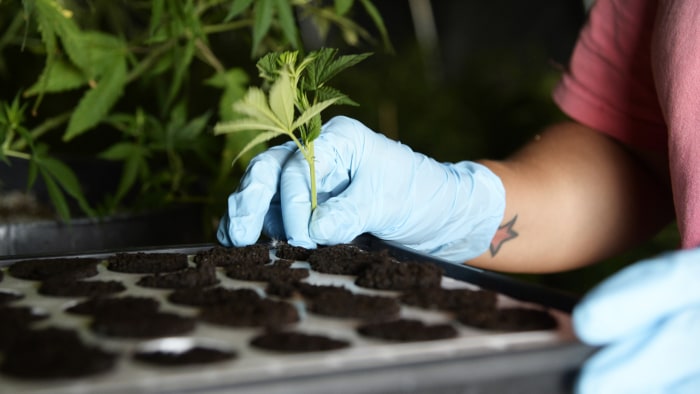Source: today.com
Have you heard of CBD oil yet? If not, you probably will soon!
It's a buzzy trend in the wellness world, and while CBD is one of the compounds found in the cannabis plant, don't worry — it won't get you high. Here's what you need to know about the latest ingredient everyone's talking about.
 Brent Lewis / Denver Post via Getty Images
Brent Lewis / Denver Post via Getty Images
Cannabidiol, or CBD, is a compound found in the cannabis plant.
What is CBD?
CBD is the abbreviation for cannabidiol, one of the many cannabinoids, or chemical compounds, found in marijuana and hemp.
You're probably already familiar with THC, which is another compound found in the cannabis plant. But unlike THC, CBD is not psychoactive. In other words, it's not what gets you stoned. It's also different from medical marijuana, which has been shown to reduce pain.
What does it do?
Research has shown CBD may be helpful by lessening anxiety for people who have schizophrenia or psychosis, or who are addicted to opiates. There's also evidence it can help children who suffer from epilepsy. Because of its anti-inflammatory properties, CBD could even help treat acne.
Advocates believe there are many potential health benefits. Clinicians say more research needs to be done, but they have a hard time getting their hands on CBD for clinical trials because the government considers it a Schedule I drug (drugs that aren’t accepted for medical use and have a high potential for abuse, according to the Drug Enforcement Administration).
"It's put under the same umbrella as THC," Yasmin Hurd, a neuroscientist at Mount Sinai Hospital in New York City, told TODAY. Hurd's research suggests CBD can positively affect opiate addicts.
"I do believe that cannabidiol has potential, absolutely," she added. "But you need studies to really be able to give us knowledge about how much CBD each day someone should take for their particular illness, and how it might interact with other medications they take. That's what you get with a clinical trial."
How do you use CBD?
CBD can be taken orally or applied topically, depending on the product. There are lots out there, from gummies and softgels that supposedly ease anxiety, to calming bath soaks, to creams and oils. Recently, these "Not Pot" chocolates have been making the rounds on our Instagram feeds.
Most of the products claim to ease pain and anxiety. But whether or not these products actually contain the amount of CBD they advertise is up for debate, because they're not approved by the Food and Drug Administration. (In fact, in 2015 the FDA sent warning letters to companies making unfounded health claims about products that supposedly contained CBD. It also tested the products and found many of them didn't even have the amount of CBD they'd advertised.)
Is CBD safe ... or even legal?
The law depends on where you live. Some states, like Colorado and California, have legalized the recreational use of marijuana, while other states have legalized medical marijuana. Still others have introduced CBD-specific legislation, such as Indiana, which earlier this year passed a bill allowing some epilepsy patients to use products containing CBD.
Buying online only complicates things further. Until there’s more research and regulation, Hurd recommends people proceed with caution.
The American Epilepsy Society states that cannabidiol research offers hope for seizure disorders, and that research is currently being conducted to better understand safe use. A study from 2016 worked with 214 people with epilepsy. The study participants added oral doses of 2 to 5mg of CBD per day to their existing anti-epilepsy medications. cbd oil vape juice
ReplyDeleteHi,
DeleteIf you need more details about CBD benefits
Pls visit my Linkedin post: Top 4 benefits of CBD vape oil
Rgs
Jennifer
Bear in mind that during the early stages of Cannabis oil treatment dizziness and fatigue can occur, but will resolve after few weeks with continued treatment. Natural hemp oil products
ReplyDeleteJUST CBD Infused CBD Gummy bears 1000mg edibles are created with all organic natural CBD and flavors, and is 100% safe to be consumed. cbd gummies
ReplyDelete